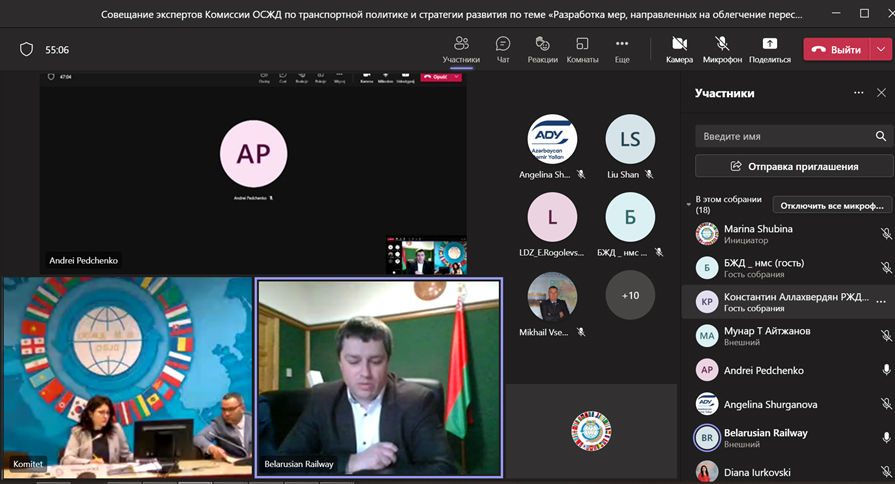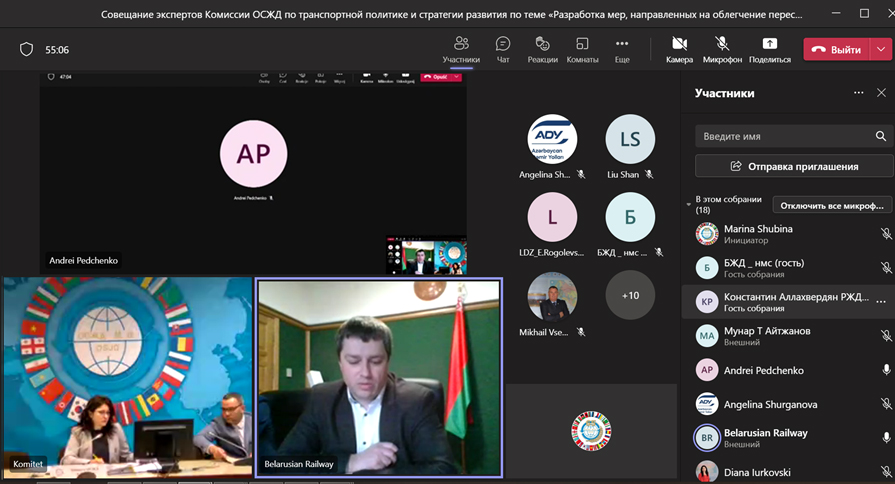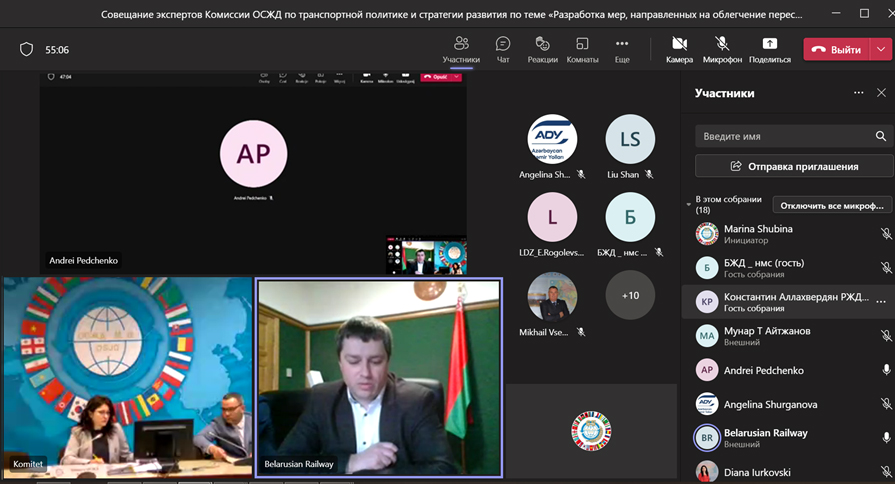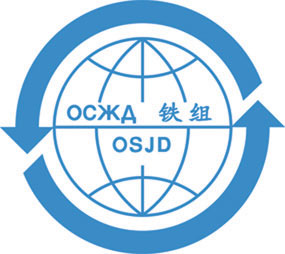Expert meeting of the OSJD Commission on Transport Policy and Development Strategy on the subject “Development of measures aimed at facilitating border crossing procedures in international railway traffic in the Eurasian space”



In accordance with the Work Plan of the OSJD Commission on Transport Policy and Development Strategy for 2022, in the period from 19 till 22 April 2022, an expert meeting was held in the format of a videoconference (OSJD Committee, Warsaw) on the subject “Development of measures aimed at facilitating border crossing procedures in international railway traffic in the Eurasian space”, which was attended by the representatives of the OSJD member countries as follows: Republic of Azerbaijan, Republic of Belarus, Georgia, Republic of Kazakhstan, People's Republic of China, Republic of Latvia, Republic of Moldova, Russian Federation, Republic of Tajikistan, Republic of Uzbekistan, as well as international organisations – the Economic and Social Commission for Asia and the Pacific (UNESCAP), the Eurasian Economic Commission (EAEC) and the OSJD Committee.
In a welcoming address, the delegations were thanked for their participation in the work and the importance of the meeting was noted for the discussion and decision-making on practical and topical issues.
The following agenda items were in the center of the meeting’s consideration:
- reasons for the delays of passenger trains and idling time of freight wagons at border (transfer) stations for 2021 were analyzed and the development of measures aimed at facilitating border crossing procedures was continued;
- revision of the progress in the implementation of the provisions of the Declaration adopted at the VIII International Interagency Meeting “Practice in Border Crossing by Rail” (22-23 September 2015, Gdansk, Republic of Poland)
- consideration of the issues of practical implementation of Annex 9 “Facilitation of border crossing procedures for international rail freight traffic” to the International Convention on the Harmonization of Frontier Controls of Goods of 1982;
- preparation and approval of the draft Work Plan of the OSJD Commission on Transport Policy and Development Strategy for 2023 and the draft Work Program for 2024 on the subject “Development of measures aimed at facilitating border crossing procedures in international railway traffic in the Eurasian space”.
The meeting participants were informed that, in accordance with the Work Plan of the Commission for 2022, the OSJD Committee kindly requested that the OSJD member submit to the OSJD Committee the analytical information on the reasons for delays in passenger train traffic and demurrages of freight wagons at border (transfer) stations in their countries for 2021 in comparison with 2020 according to the approved templates in the form of tables for “International passenger traffic” and for “International freight traffic”.
Based on the data received from the OSJD member countries, the working staff of the Commission analyzed and summarized information on the causes of delays in passenger trains traffic and idling time of freight wagons at border (transfer) stations for 2021 as compared to 2020, presenting summarized information to the meeting participants.
During the discussion, the delegations noted that the decrease in passenger traffic was caused by the restrictions and the closure of interstate borders as part of the measures taken by the countries to prevent the spread of the coronavirus pandemic.
The meeting participants were informed that in the period from 21 till 23 September 2021 the IX International Interagency Meeting of the OSJD member states on facilitation of border crossing by rail in international freight and passenger traffic “Practice in Border Crossing by Rail” was held in Gdansk (Republic of Poland), which was attended by the representatives of the ministries of transport and railway administrations, customs and border bodies of the OSJD member countries, OSJD observers (FPC JSC, VR Group), international organisations (UNECE, UNES- CAP, EAEC, CIT, CCTT).
The meeting was held in parallel with the TRAKO- 2021 railway exhibition, which contributed to wider communication between the meeting participants and numerous representatives of the international railway community.
During the IX International Interagency Meeting, the progress was analyzed in the field of border crossing by rail, and the issues of coordination and promotion of interagency cooperation at the international level were considered in order to implement more effectively the international railway transport towards promoting goods transport and passenger services, as well as comments and proposals were made from the representatives of the border, customs and railway departments on the issues under discussion.
To sum up the outcomes of the work, the participants adopted the final document “Recommendations of the IX International Interagency Meeting of the OSJD member states “Practice in Border Crossing by Rail””, on the implementation of which the information exchange is in progress.
The meeting supported the proposal, set out in the final document of the IX International Interagency Meeting, to hold subsequent International Interagency Meetings on the facilitation of border crossing procedures by rail with an interval of 2 years.
During the discussion, the meeting participants summed up the proposals and considered it expedient to include into the draft Work Plan of the OSJD Commission on Transport Policy and Development Strategy for 2023 holding of the X International Interagency Meeting of the OSJD member states on facilitation of border crossing by rail in international freight and passenger traffic “Practice in Border Crossing by Rail”.
The OSJD member countries were also recommended to continue their work towards the implementation of the provisions of the Gdansk Declaration with subsequent exchange of information on the progress in the implementation of those provisions.
The meeting participants were provided with the information received from the OSJD member countries regarding the work for the practical implementation of Annex 9 “Facilitation of border crossing procedures for international railway freight traffic” to the International Convention on the Harmonization of Frontier Controls of Goods of 1982.
The importance of the fact that one of the factors in accelerating the passage of goods across borders and reducing the time for carrying out border control procedures and optimizing the processing time of transit goods at border checkpoints is the introduction of information digital technologies and electronic document management, improving the quality of information when exchanging the data electronically between the railway administrations. At the same time, railway administrations, together with the customs and other regulatory authorities, need to improve the technological processes for the clearance of goods at the checkpoints. With this goal in mind, for the implementation of the action programme, the positive effects of the electronic preliminary informing of the customs authorities on the procedure for clearing goods at checkpoints is assessed.
The meeting participants considered and took note of the presentation on the subject “UNESCAP Border Crossing Facilitation Initiatives”, delivered by Sandeep Raj Jain, Economic Affairs Officer, Transport Connectivity and Logistics Section, UNESCAP Transport Division.
Pursuant to the Recommendations of the IX International Interagency Meeting of the OSJD member states “Practice in Border Crossing by Rail” (21-22 September 2021, Gdansk, Republic of Poland), a draft OSJD-UNESCAP document on the harmonization of customs procedures in international railway traffic was provided.
It was noted that the development of a draft OSJD-ESCAP document on the harmonization of customs procedures in international railway traffic is expedient.
The meeting have agreed to include into the draft Work Plan of the OSJD Commission on Transport Policy and Development Strategy for 2023 the provision of work on the subject
“Development of measures aimed at facilitating border crossing procedures in international railway traffic in the Eurasian space”.
